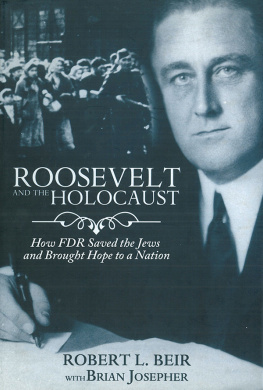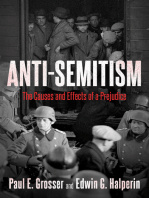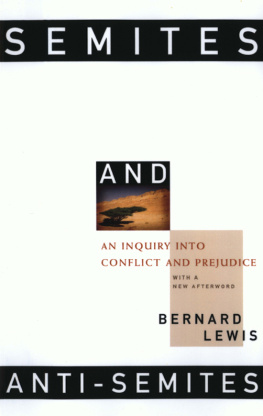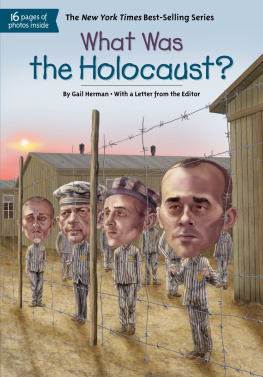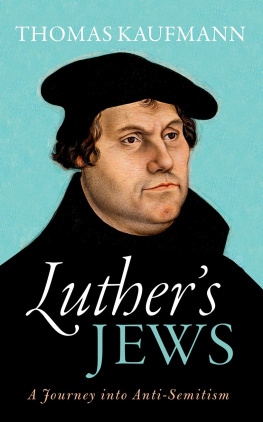Roosevelt and the Holocaust
Roosevelt and the Holocaust
How FDR Saved the Jews and
Brought Hope to a Nation
Robert L. Beir
with Brian Josepher

Skyhorse Publishing
Copyright 2006, 2013 by Robert L. Beir and Brian Josepher
All Rights Reserved. No part of this book may be reproduced in any manner without the express written consent of the publisher, except in the case of brief excerpts in critical reviews or articles. All inquiries should be addressed to Skyhorse Publishing, 307 West 36th Street, 11th Floor, New York, NY 10018.
Skyhorse Publishing books may be purchased in bulk at special discounts for sales promotion, corporate gifts, fund-raising, or educational purposes. Special editions can also be created to specifications. For details, contact the Special Sales Department, Skyhorse Publishing, 307 West 36th Street. 11th Floor, New York, NY 10018 or info@skyhorsepublishing.com.
Skyhorse and Skyhorse Publishing are registered trademarks of Skyhorse Publishing, Inc., a Delaware corporation.
Visit our website at www.skyhorsepublishing.com.
10 9 8 7 6 5 4 3 2 1
Library of Congress Cataloging-in-Publication Data is available on file.
ISBN: 978-1-62087-626-8
Printed in the United States of America
To my beloved wife Joan:
Grow old along with me!
The best is yet to be....
Robert Browning
To do justice to a great man, discriminating criticism is always necessary.
Sir Winston Churchill

Contents

Foreword
By Ernest Michel
T he first time I heard the name Franklin Delano Roosevelt was in 1933 in a movie theater during a newsreel. I was ten years old. Roosevelt had just been elected President of the United States. From my earliest days I was fascinated by history. I remember clipping articles from German newspapers. One of them stated that the American President, Roosevelt, was a descendant of a Jewish family by the name of Rosenfeld, an obviously Jewish name.
I am a Holocaust survivor. I was born and raised in Germany. I was arrested by the Gestapo at age sixteen in September 1939 and spent more than five years in various concentration camps, Auschwitz-Buna, Birkenau, Buchenwald, and finally Berga. Since 1933 the name and image of President Roosevelt played a major role in my life. He was my hope. If the United States and its allies could defeat the Nazis, maybe I had a chance to survive. That became a possibility at Auschwitz, as the Russian army advanced into Poland from the East. On January 18, 1945, Auschwitz was evacuated. Sixty thousand prisoners, I among them, began a death march into Germany. Half did not make it.
On April 11, 1945 the concentration camp Berga was evacuated. Again I joined a death march. That night we slept in an old factory, huddled close together desperately trying to keep warm. The next day, April 12, the Nazi commander announced over the megaphone that the American warmonger, Roosevelt, is dead and Germany would now win the war.
Roosevelt dead? It could not be. It was a blow unlike any other I had experienced. That evening 10 prisoners were lined up and shot. Six days later, on April 18, I escaped.
In 1946 I immigrated to the United States under the Harry S. Truman Displaced Persons quota with the support of the United Jewish Appeal and started my new life. I eventually joined the staff at that organization and began a serious study of the history of that period.
What I learned was disturbing. In 1939, nine hundred Jews on board the SS St. Louis were turned back from the shores of Miami after having been refused entry into Cuba. The ship with the distraught passengers, as detailed so effectively in this book, returned to Europe. Some thirty percent of the passengers eventually were murdered in the death camps.
Breckinridge Long, the official in charge of the Visa section at the State Department, issued an edict to all American Consular officials to postpone, postpone, and postpone the immigration of Jews to the United States despite the fact that the quota was never filled. I was among those he prevented from coming to the United States after, by a miracle, I had obtained an affidavit.
The train tracks to Auschwitz were never bombed. John McCloys explanation was that the distances were too great and that the punishment in the camps would have been even more severe. More severe than putting Jews into gas chambers? The I. G. Farben factory in Auschwitz-Buna was bombed by Allied planes in the fall of 1944. It happened on a Sunday. I was there.
Throughout the war era, Jews in America overwhelmingly voted for FDR. He was a hero. He was my hero. He was Bob Beirs hero. And yet, when we talk about the Holocaust, the question remains: Where was my heroa hero to us allwhere was Roosevelt?
Much has been written about FDR. Even more has been written about the Holocaust by hundreds of authors, many of them survivors, myself included. The entire tragic period is one of the most reported, analyzed and documented in all of history. And yet Bob Beir has broken new ground. Bob Beir, in this detailed, well-researched, well-documented book, lifts the curtain on FDRs role. The more one reads of this book, the clearer it becomes.
President Roosevelt failed to use his powers, and the huge resources of the Allied armies, to save European Jews. The Presidents first and principal objective was to win the war. This he did. Could he at the same time have done more to save Jews? In my opinion, the answer is an unqualified yes.
Does that detract from FDRs greatness? The answer is absolutely not. Franklin Roosevelt is still my hero and he remains a giant in world history. And for good reason. His leadership helped to preserve western civilization.
Ernest W. Michel

Acknowledgments
I decided, at eighty-five years old, to take on a new challenge: the writing of this book. Writing about the Holocaust, at any age, but especially at eighty-five, is agonizing. Those events took place during my youth. At a time when I was a boy and at play on the Jersey shore, the pogroms in Germany began. At a time when I attended college, Jews in Germany and Austria were scrubbing the sidewalks with toothbrushes, while the SS and the crowds screamed insults. At a time when I went to business school, the massacres intensified. Why couldnt we in America have done more to help those in peril in Europe? Thats the question throughout this book. Thats the question that I continue to ask myself, relentlessly.
Many times I wanted to quit this writing project. The reasons varied, from health issues to the internal struggle involved in actually doing the writing to the trauma associated with researching this horrific subject. Somehow I persevered and I am amazed now to be writing an acknowledgment section. Certainly, though, I owe a series of people a debt of gratitude.
I relied heavily on three young people for guidance in the writing process, for editing, for support. My son-in-law, Dennis Meade, is a renaissance man. A scholar, a critic, a friend. Dennis never gave up on me; I still find his positive attitude inspiring. Dennis, this book would not exist if not for your efforts and I am forever grateful.
Rhona Silverbush, a professional writer, a Shakespeare scholar, a good friend, saved this project on more than one occasion. I went off base frequently. I took some strange tangents. Rhona brought me back to the story, back to the heart of the matter. Rhona, you are a wonderful counsel and I thank you so much.

